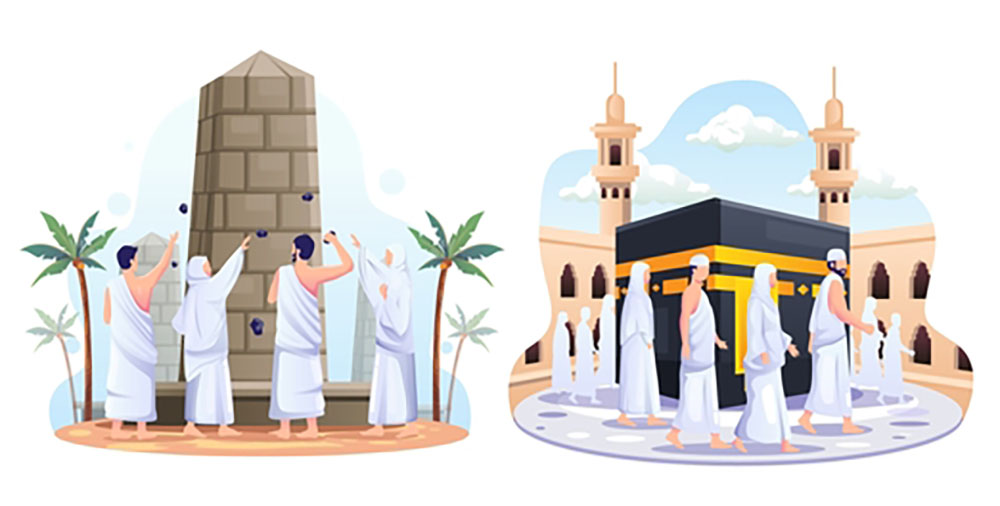
Hajj is an integral part of Islam, encompassing one of the five pillars and holding great significance in Islam. It is obligatory for every financially and physically capable adult Muslim. Every year, millions of Muslims from all walks of life converge on the holy city of Mecca in Saudi Arabia to perform this sacred pilgrimage. The process can seem daunting for first-time pilgrims, but Hajj can be a life-changing and spiritually fulfilling experience with proper knowledge and guidance. This guide will walk you through the essentials of performing Hajj, including the key rituals, common mistakes to avoid, and frequently asked questions for First-Time Pilgrims.
Ready to expand your knowledge of Islam? Al-Dirassa offers a wide range of online courses, designed to suit your needs, whether for personal growth, deepening your faith, or academic purposes. Join us today and start learning with purpose.
Hajj is a religious pilgrimage to Mecca that every Muslim is required to undertake at least once in their lifetime, provided they are physically and financially capable. It is one of the five pillars of Islam, marking a profound act of worship and submission to Allah. Hajj takes place annually during the Islamic month of Dhu al-Hijjah, the last month of the Islamic lunar calendar.
The pilgrimage consists of a series of rituals, some of which are symbolic of the lives of key figures in Islamic history, such as the Prophet Ibrahim (Abraham), his wife Hajar (Hagar), and their son Isma’il (Ishmael). These rituals are designed to foster unity, humility, and spirituality among Muslims, as they gather from all over the globe to worship in the same place.
Don’t want to go through the translation anymore?
30 free minutes with your qualified Egyptian teacher.
For those embarking on their first Hajj, it is essential to understand the sequence of rituals that make up the pilgrimage. These rituals are a combination of physical actions and prayers, each with deep spiritual significance.
Every Muslim who is physically and financially able to perform Hajj is required to do so at least once in their lifetime. This includes having the financial means to cover the expenses of travel, accommodation, and the pilgrimage itself.
Hajj lasts for five days, from the 8th to the 12th of Dhu al-Hijjah. However, pilgrims often arrive in Mecca a few days before the start of the rituals.
Women are required to perform Hajj with a male guardian (mahram) unless they are part of an organized group of women. This requirement ensures their safety and well-being during the pilgrimage.
Arafat is the site where Prophet Muhammad delivered his final sermon. The day of Arafat is considered the most spiritually significant day of Hajj, as it is a day for prayer, reflection, and seeking forgiveness from Allah.
Hajj is considered an opportunity to cleanse one’s sins and earn immense spiritual rewards. The Prophet Muhammad (PBUH) said that a properly performed Hajj is a means of attaining Paradise.
In conclusion,Hajj is not just about completing a set of physical actions; it’s about the spiritual significance behind each ritual, the reflection on one’s faith, and the unity experienced with millions of fellow Muslims. As you prepare for this incredible journey, remember that it is a once-in-a-lifetime opportunity to grow closer to Allah and attain spiritual fulfillment. May your pilgrimage be accepted and bring you peace, forgiveness, and blessings.
Learn from the best with Al-Dirassa’s expert-led Islamic courses. Whether you’re looking to deepen your connection to your faith or gain a comprehensive understanding of Islamic teachings, we offer the courses you need. Start today
To know more: What is Sadaqah in Islam? Meaning, Types, and Benefits
Discover the experiences of our delighted clients who have thoroughly enjoyed utilizing this standout feature.
Alhamdulillah I‘m very pleased with the arabic and Qur’an lessons I receive from teacher Umm Tasneem and I‘m also content with the al-dirassa administration team who were very quick in answering any questions I had. In a month I progressed a lot and I cannot wait to continue my studies with al-dirassa. May Allah reward everyone at al-dirassa.
Verified review - view original
My Qur’an teacher is fantastic, she teaches me in a loving and kind way where I look forward to the lessons and learn so much. My Arabic teacher is equally as nice and has a lot of patience with me, she has great expertise in the field and I’ve progressed really quickly with her. Thank you Al-dirassa!
Verified review - view original

Al-dirassa Institute offers you a gift to help you begin your journey to being fluent in Arabic and learning the Quran.

Al-dirassa Institute offers you a gift to help you begin your journey to being fluent in Arabic and learning the Quran.